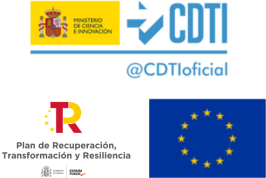- Optimal management of public transport based on passenger demand prediction
- 2022 – 2024

The project
PASSPORT was an industrial research project led by Nommon and co-financed by the Center for the Development of Industrial Technology (CDTI) and the European Regional Development Fund (ERDF). Its goal was to provide public transport authorities and operators with a tool to help them integrate the evaluation and design of the public transport offer into the overall planning process, so that the service would respond quickly to changes in the mobility needs of the population. The project started in September 2021, had a duration of 18 months, and a fundable budget of 419,457.15 euros.
Context
It is widely accepted that the public transport planning process essentially consists of the following phases:
- Design of the transport network.
- Definition of the service on each line through the construction of timetables.
- Sizing: calculation of the number of resources (vehicles and drivers) needed to cover the service.
- Operation of the service.
From the point of view of the service that public transport offers to users, the most important steps in the process are the first two. Assigning a vehicle and a driver is essential for the operation, but has no repercussions from the point of view of the service offered, that is, efficiently sizing the fleet and drivers is fundamental to ensure that the service has contained costs but has little influence on the service. On the other hand, the design of transport lines and timetables is critical, both from the point of view of operating costs and from the point of view of passengers. It directly conditions their use of public transport, which depends on which routes they can take and how much time they will spend on their journey.
While there are numerous tools on the market aimed at supporting the sizing and operation phases, there is a notable lack of specific tools to support public transport authorities and operators in the areas of network design and service definition. The PASSPORT project proposed to develop a solution to fill this niche, taking advantage of the most recent advances in artificial intelligence and integrating big data, machine learning and optimisation technologies.
PASSPORT’s goals
PASSPORT aimed to lay the foundations for a commercial solution that would help authorities and transport operators to monitor and adjust transport supply to expected passenger demand, thus improving the quality of public transport services and increasing their modal share. In short, the aim was to contribute to the economic sustainability of public transport and, ultimately, to more socially and environmentally sustainable mobility.
From the scientific-technical point of view, the project addressed the following aspects:
- Develop data analysis and fusion techniques that, based on the different data sources available, allowed characterising in a precise and detailed way the behaviour of public transport demand.
- Develop predictive models capable of reliably estimating the future demand for public transport services under different supply scenarios.
- Develop service supply optimisation models that took into account future demand behaviour. These models shall enable public transport authorities and operators to determine the optimal network design and service schedules.
Results
During the development of the PASSPORT project, the market’s need for tools to analyse demand and plan transport services accordingly was confirmed, highlighting the importance of continuous monitoring to improve public transport operations. The main outcome of the project was the development of a decision-support tool for public transport authorities and operators, which led to the creation of Nommon’s solution WiseTransit.
The tool includes various modules to address different use cases relevant to operators and authorities:
- The operation analysis module provides the capability to understand in detail the interaction between the supply and demand of public transport services through different use cases, such as:
- Passenger demand analysis on each line by time slot and between stations.
- Vehicle occupancy analysis.
- Transfer analysis.
- The operation module allows adjusting the service to the expected demand through functionalities such as:
- Demand prediction by line and time slot.
- Optimal allocation of vehicles by line.
- Optimised schedule design.

PASSPORT, with file number IDI-20230241, is a project financed by the Centro para el Desarrollo Tecnológico e Industrial (CDTI) and the European Regional Development Fund (ERDF). "A way to make Europe"
